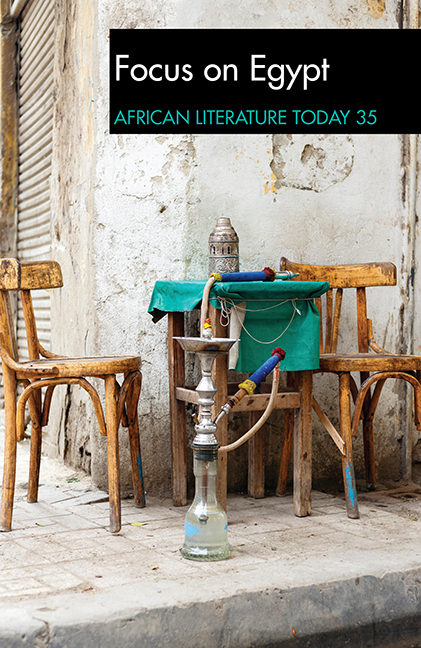Book contents
- Frontmatter
- Dedication
- Contents
- Notes on Contributors
- Foreword
- EDITORIAL ARTICLE
- ARTICLES
- Coping with a Failed Revolution: Basma Abdel Aziz, Nael Eltoukhy, Mohammed Rabie & Yasmine El Rashidi
- The Complications of Reading Egypt as Africa: Translation & Magdy el-Shafee's مترو (Metro)
- Narratives of the ‘Nubian Awakening’: Reclaiming Egypt's African Identity
- Frantz Fanon's Conceptualization of Decolonization in Sonallah Ibrahim's The Committee
- Romance as Epistemological Aesthetic in the Fiction of Ahdaf Soueif
- Literature as Prophecy: Re-Reading Yusuf Idris's The Cheapest Nights
- Travel & Discovery: Hopes for a New Egypt in Mohamed Salmawy's Butterfly Wings
- The Symbolic Relevance of the Use of the Eye in Nawal El Saadawi's Two Women in One & God Dies by the Nile
- African Epics: A Comparative Study of Sundiata & Al-Sirah al-Hilaliyyah
- Conversations with Nawal El Saadawi: Online interview
- FEATURED ARTICLES
- LITERARY SUPPLEMENT
- TRIBUTE
- REVIEWS
- Reviews of Nigerian Poetry
The Complications of Reading Egypt as Africa: Translation& Magdy el-Shafee's مترو (Metro)
from ARTICLES
Published online by Cambridge University Press: 24 August 2019
- Frontmatter
- Dedication
- Contents
- Notes on Contributors
- Foreword
- EDITORIAL ARTICLE
- ARTICLES
- Coping with a Failed Revolution: Basma Abdel Aziz, Nael Eltoukhy, Mohammed Rabie & Yasmine El Rashidi
- The Complications of Reading Egypt as Africa: Translation & Magdy el-Shafee's مترو (Metro)
- Narratives of the ‘Nubian Awakening’: Reclaiming Egypt's African Identity
- Frantz Fanon's Conceptualization of Decolonization in Sonallah Ibrahim's The Committee
- Romance as Epistemological Aesthetic in the Fiction of Ahdaf Soueif
- Literature as Prophecy: Re-Reading Yusuf Idris's The Cheapest Nights
- Travel & Discovery: Hopes for a New Egypt in Mohamed Salmawy's Butterfly Wings
- The Symbolic Relevance of the Use of the Eye in Nawal El Saadawi's Two Women in One & God Dies by the Nile
- African Epics: A Comparative Study of Sundiata & Al-Sirah al-Hilaliyyah
- Conversations with Nawal El Saadawi: Online interview
- FEATURED ARTICLES
- LITERARY SUPPLEMENT
- TRIBUTE
- REVIEWS
- Reviews of Nigerian Poetry
Summary
One of the mostpernicious obstacles to African literary studiesincorporating the entire African continent in its purview isthe persistent division between northern and southern Africain literary scholarship. As Ziad Bentahar has recentlyargued, a de facto consensus exists between African literarystudies and Arabic literary studies that ‘ “Africa” nowostensibly stands for sub-Saharan Africa, whereas NorthAfrica is considered in many academic disciplines to be partof the Middle East instead’ (‘Continental Drift: TheDisjunction of North and Sub-Saharan Africa’: 1). Bentahar'sappraisal is not unique; it echoes those of previousscholars, such as Farida Abu-Haidar (‘Arabic Writing inAfrica’) and Anissa Talahite (‘North African Writing’), invoicing frustration that African literary studies has failedto substantially incorporate North Africa despite beingurged to do so for decades. In the wake of this exclusion ofNorth African literature in our field, this article makes acase for increased inclusion, as well as highlightingbarriers, by examining a particular Egyptian text in theoriginal Arabic and in English translation, Magdyel-Shafee's مترو (Metro), that has beenread as World literature and Arabic literature rather thanAfrican literature.
Although thenorthern/southern African studies division elides thecontribution of many African literatures (principally thosein Arabic and Berber) to African literature writ large,Egyptian literature in particular has been problematicallyoverlooked. For centuries, Cairo has stood out as anintellectual hub, and beginning in the early twentiethcentury it cemented its status in the print era as thepublishing capital of North Africa. With Cairo as one of therichest production and distribution points in Africa,Egyptian literature flourished in the twentieth century withlittle recognition within African literary studies. Thisdivision has narrowed the scope of what the field considersits purview to largely exclude Egyptian literature despiteits impressive quantity and quality, reproducingdisciplinary oversight by labelling only sub-Saharan worksas African literature in global circuits.
Popular Africantexts that circulate outside of individual African localesand the continent as a whole have been aptly termed byRebecca Walkowitz as ‘born translated’, i.e. imagining aglobal audience from its inception and therefore written inEuropean languages with embedded didactic culturalexposition for audiences with minimal local knowledge.
- Type
- Chapter
- Information
- ALT 35: Focus on EgyptAfrican Literature Today 35, pp. 22 - 38Publisher: Boydell & BrewerPrint publication year: 2017

